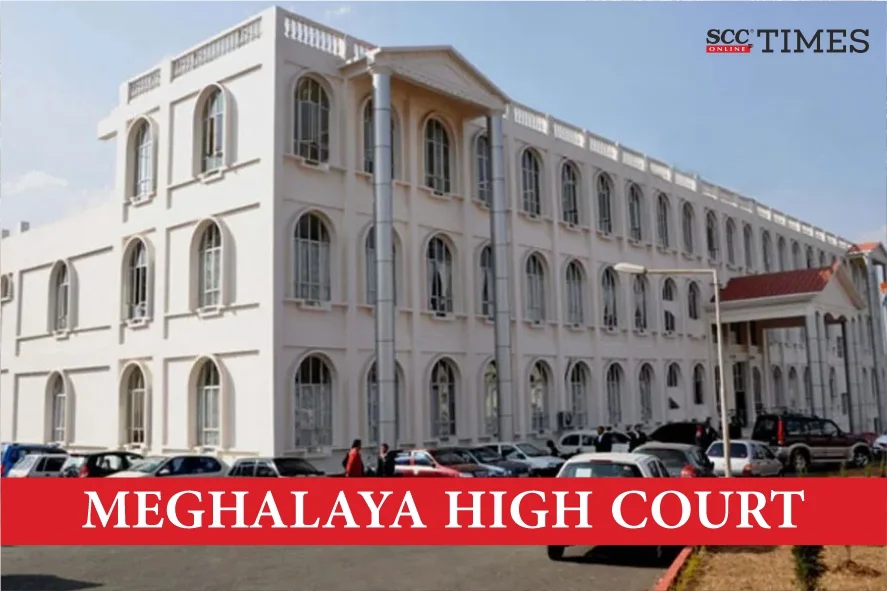Meghalaya High Court: In a civil writ petition for quashing the selection process by which the respondents were appointed as Magistrate First Class, Subordinate District Council Court, Khasi Hills Autonomous District Council (‘KHADC’) on the ground that the appointment was made over and above the number of vacancies advertised, H. S. Thangkhiew, J. dismissed the petition holding that the appointments of the three judicial officers, in challenge, was made due to compelling circumstances and on the basis of a policy decision, and also in consideration of the fact that these officers are presently manning positions in outlying benches of the District Council Courts, which are special in nature for the past two years.
The KHADC called for applications for filling up of three vacancies for the post of Magistrate First Class. On the basis of the written examination conducted, six candidates qualified for the interview. After the interview, in the final list, three candidates were declared selected and three candidates i.e. the present respondents were placed in the waiting list. Thereafter, the KHADC sought approval from the Registrar (Judicial Service) High Court of Meghalaya, for filling up the remaining vacant posts from the wait list as a special condition, as it was not conducive to conduct fresh examinations because of the situation in the State and country, and in view of the fact that there were many pending cases that required speedy trial. The Registrar and the State, both approved the said appointments. The respondents thereafter, were issued appointment orders and joined their respective posts, which is now under challenge.
Analysis and Decision
Whether the appointments of candidates over and above the advertised vacancies, was justifiable or whether the said decision was arbitrary and illegal?
The Court noted that the District Council Courts have been set up under the mandate of the Sixth Schedule to the Constitution of India, wherein the District Councils have been invested with powers to constitute Courts for the trial of suits and cases between the parties who belong to the Scheduled Tribe; and these judicial officers who are then appointed into such Courts are conferred with powers under Paragraph — 5(1) of the Sixth Schedule by the Governor. The District Council is the appointing authority, and the recruitment rules have not yet been published.
The Court reiterated that in recruitment for public employment, once the advertised vacancies as published have been filled up, there is no question of recourse being taken to fill up further vacant posts, from the same selection process. Further, a select list cannot be treated as a reserve list for the purposes of issuance of appointment, so that vacancies can be filled up by taking the names from the list, as and when required, and that further no authority or Government can fill up vacancies for the future. The Court referred to Arup Das v. State of Assam (2012) 5 SCC 559, wherein the Court noted that in Prem Singh v. Haryana State Electricity Board (1996) 4 SCC 319 while holding that if the requisition and advertisement are for a certain number of posts only, the State cannot make more appointments than the number of posts, the Court held that if the State could deviate from the advertisement and make appointments in posts falling vacant thereafter in exceptional cases or in an emergent situation, and, that too, by taking a policy decision in that behalf.
Further, the Court noted that in Gujarat State Dy. Executive Engineers’ Association v. State of Gujarat 1994 Supp (2) SCC 591, with regard to the wait list not being a source of recruitment, it was discussed that “while refraining from quashing the appointment made in pursuance of the direction issued by the High Court, the waiting list for one year cannot furnish source of recruitment for future years, except in very exceptional cases. It is, however, necessary to add that non-holding of examination at the instance of the Government could not result in reducing the quota of direct recruits to be worked out on the principle for determination of such vacancies.”
The Court perused the reasons given by the KHADC for impugned appointments to be threefold, firstly, that the holding of fresh examinations for three posts was not feasible and conducive, due to the COVID pandemic in 2021; secondly, due to the demand, benches of the District Council Courts were to be commissioned in three outlying districts namely, West Khasi Hills, South West Khasi Hills and Ri-Bhoi District; and thirdly, due to the need for speedy trials of cases. The Court said that deviations are permissible when exceptional circumstances are prevalent, or the same can be resorted to meet an emergent situation.
“Such appointments would be permissible for clear and anticipated vacancies, but not for future vacancies.”
In the case at hand, the Court held that the deviation from the advertisement was caused by the threefold reasons, for which a considered policy decision, was taken to address the situation and hence, the same called for no interference. On the aspect of the vacancies, for which appointments were made from the waiting list, the same were against two existing vacancies, and one was against an anticipated vacancy, which was under the process of being sanctioned and was thereafter sanctioned vide letter dated 19-08-2021, and as such, the appointments were not made against future vacancies.
[Naphibanmer Laso v. Khasi Hills Autonomous District Council, 2024 SCC OnLine Megh 644, Decided on: 26-07-2024]








